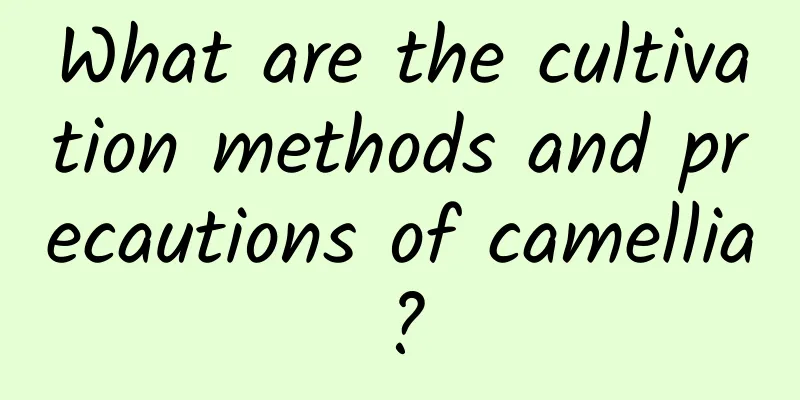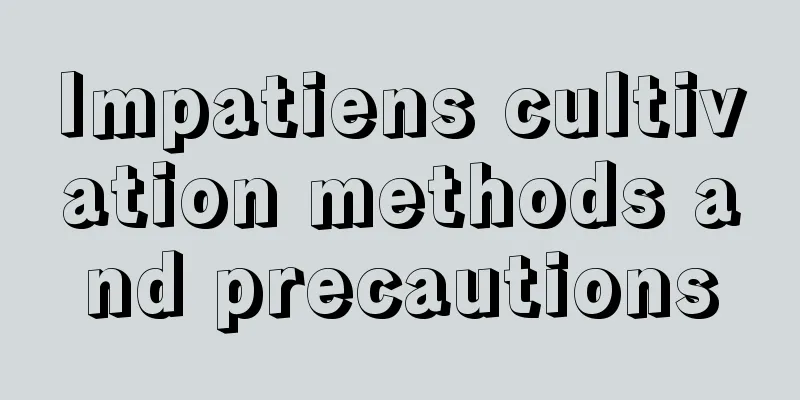What are the cultivation methods and precautions of camellia?

Camellia growth habitsCamellia is a plant of the Theaceae family. It likes sunshine and moisture, and likes to grow in high, warm, humid, loose and fertile sandy loam. It grows best in an environment of 20-32 degrees. If it is higher than 35 degrees, the leaves will burn. It can withstand low temperatures of -8 degrees. Camellia cultivation methodLight requirements: We must provide camellia with sufficient light. If a flower bud is blocked by the leaves at the top, the leaves must be pulled out to ensure that the flower bud can be exposed to the sun. Temperature requirements: The climate is cold in winter. Once the temperature drops below 0℃, long-term low temperature will cause the plants to freeze, and the flowers and buds will fall off. It is best to keep the temperature between 5~15℃. Watering method: Camellia in the north must be watered after the alkaline water is acidified. Store the tap water for 2 days before watering. The amount of water should not be too much or too little. It is better to keep the soil moist. Fertilization method: Camellia likes fertilizer. When planting, apply enough organic fertilizer as base fertilizer. In autumn and winter, water it with decomposed light liquid fertilizer once a week, apply phosphorus and potassium fertilizer once, apply thin fertilizer water after germination in spring, and apply phosphorus and potassium fertilizer in summer. Pruning method: Camellia pruning is mainly carried out in autumn or before budding in spring. At this time, dry branches, crossed branches, branches that affect the shape of the tree should be cut off, and excess flower buds should be thinned out. Camellia cultivation precautionsPrevention and control of pests and diseases: Camellia should pay attention to the prevention and control of pests and diseases such as anthracnose, camellia cake disease, red spiders and scale insects. If the ventilation is poor and the air humidity is high, pests and diseases are likely to occur. You can use equal amounts of Bordeaux mixture and carbendazim to spray for prevention and control. Increase humidity: Camellia prefers a higher air humidity environment. In the north where the indoor air is relatively dry in winter, it is best to place a few basins of water next to the flower pot, or add a humidifier to increase the humidity. Enhance ventilation: Also pay attention to ventilation issues in winter. Never keep camellia in a closed space for a long time, otherwise it will easily cause the flowers and buds to fall off. It is best to open the windows for ventilation for 2 hours at noon every day. |
>>: Can Euphorbia pilosa be hydroponically cultivated? Hydroponics methods and precautions
Recommend
Can walnut green peel be used as fertilizer? How to ferment it to make fertilizer
The nutrients contained in walnut green peel fert...
Smooth sailing breeding method
1. Seeding method You can artificially pollinate ...
Where do cherries grow?
1. Where does it grow? Cherries grow on cherry tr...
How to plant yew seeds
Processing seeds The seeds are harvested after th...
Causes and treatments for yellow leaves of Calla Lily
1. Improper watering 1. Reason: Calla lily likes ...
Is Christmas cactus suitable for a large or small pot?
Should I use a large or small pot for Christmas c...
What to do if the orchid doesn't like to grow
1. Temperature This is a flower that prefers warm...
How often should I water the loofah? The correct way to water it
Introduction to loofah Luffa likes a moist enviro...
When and how to change the soil of banyan bonsai
Banyan bonsai soil changing time After the shape ...
Can Monstera be hydroponically cultivated? Methods and precautions for hydroponics
Can Monstera be hydroponically cultivated? Monste...
Is it normal for orchid leaves to curl after being potted? How to deal with it after potting
1. Is it normal? It is normal for leaves to curl ...
How many years does the jujube tree bear fruit?
Introduction to Planting Soft Jujube Trees The ju...
Causes and treatments for yellow leaves of gardenia
1. Excessive watering 1. Reason: Gardenia likes a...
What does green radish mean?
1. Kindness Its flower language is kindness. It c...
The best way to quickly root green radish in hydroponics
The cultivation method of green radish is relativ...









